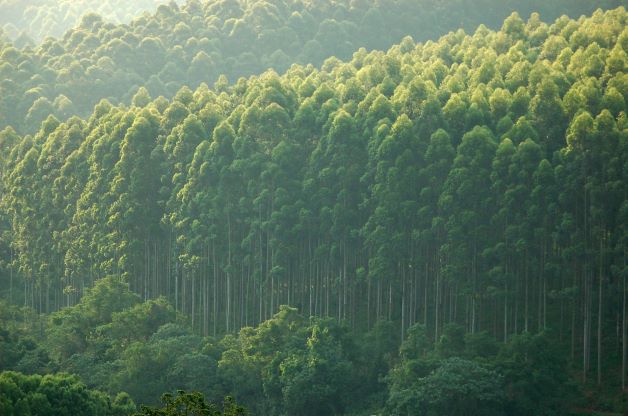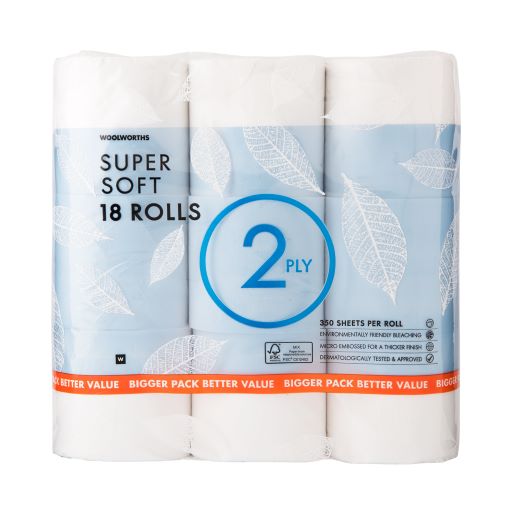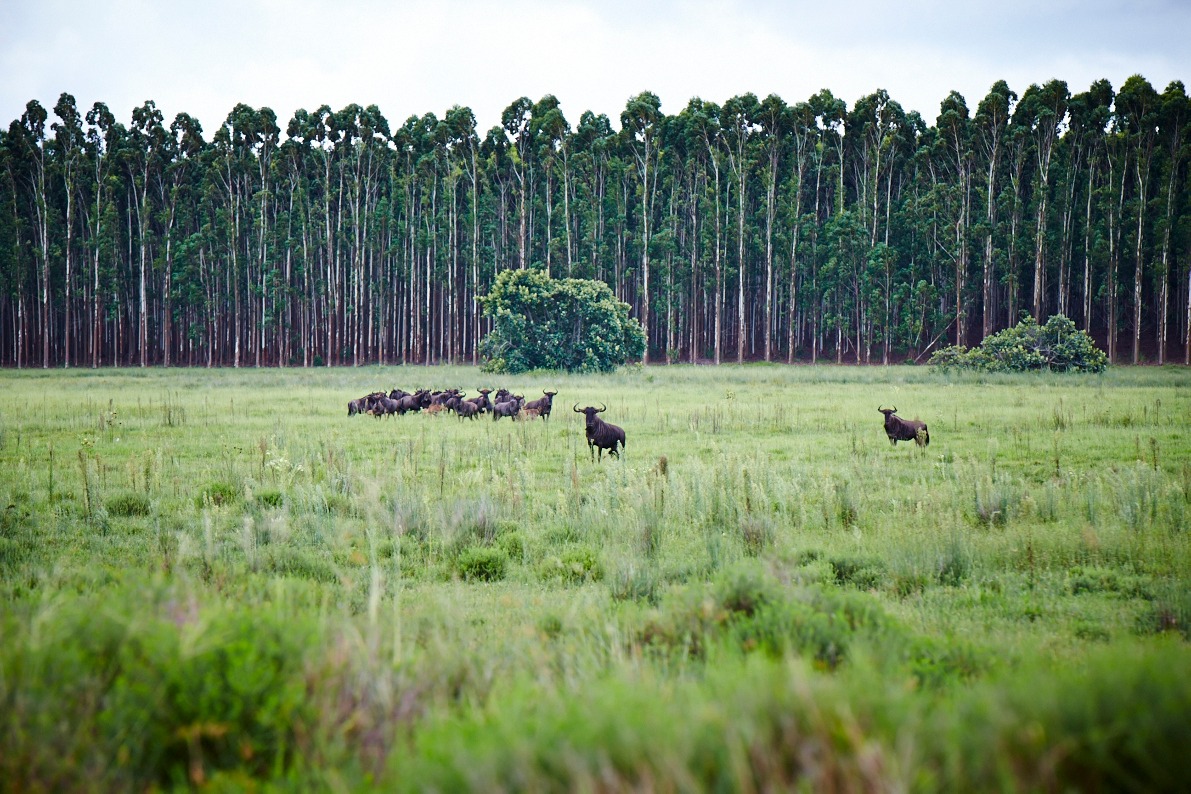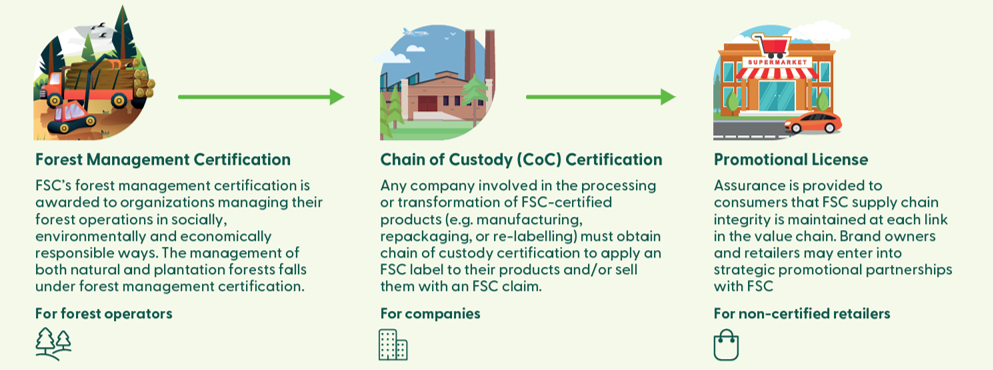Sustainable Production and Consumption enabled through FSC certification
The United Nations General Assembly proclaimed 21 March the International Day of Forests (IDF) in 2012. This year the theme is "Forests and sustainable production and consumption."
Forest products are a vital part of our daily lives
Various products are derived from wood and trees – some timber related products may even surprise you – such as cosmetics, biochemicals, textiles, food ingredients, rubber products such as tyres and shoes, bioplastics and medicines. Replacing less-sustainable materials with renewable wood and tree-based products can reduce the carbon footprint particularly in building structures.

The building and construction sector is responsible for almost 40 percent of energy-related greenhouse gas emissions globally. Innovation is making it now possible to use more wood more extensively in mass timber buildings and other infrastructure. This helps us to “green” our cities because wood stores carbon, requires less energy to produce than many other construction materials, and provides good insulation. (FAO, 2022)

However, these materials can sometimes be the product of deforestation or poor forestry practices. In that case, they pose a threat not only to the world’s forests but also to businesses and brand reputation.
Halting deforestation and forest degradation and practising responsible forest management are important for limiting climate change and its impacts, as well as protecting biodiversity and freshwater supplies, providing raw materials for a ‘low ecological footprint’ economy, and protecting the livelihoods of hundreds of millions of people.
Consumers are worried
Consumers are worried about climate change. They are aware of the link between responsible management and the preservation of forests – one of the world’s most precious resources. The role of forests in mitigating climate change is also widely recognised. Consumers expect companies to be a part of the solution, and to sell products made with sustainable and responsibly sourced materials. Environmentally conscious consumers rely on Ecolabels, such as Forest Stewardship Council® (FSC®) to provide the means for informed pre-purchase decision making, guiding their purchasing habits towards products manufactured from responsible sources. (UNEP 2021)
According to research conducted by GlobeScan in 2021 for FSC across 15 countries , consumers list climate change as their second most important global worry. When compared against the previous 2017 study , this concern is significantly up. Understandably, disease/health issues ranked first in the research, although the comparable level of concern about climate change sends a stark message in terms of urgency to act. For forests specifically, the research found increasing concerns about the loss of plant and animal species and the impact of deforestation on climate change.

The trends are showing that consumers are increasingly concerned for the environment and the impact of their purchasing habits on it. The elephant in the room is whether they are willing to pay more for sustainably produced products or not. A collaboration between retailers (push) and consumers (pull) is needed to bring about meaningful changes in consumption and production patterns argue De Winter, Zimmermann, and Danse (2008). Overseas green loyalty/rewards program which offer incentives for consumers making green choices, have shown to positively influence consumer behaviour towards green purchasing. (Peach 2021). We do have a number of retail customer reward programmes in South Africa, but to our knowledge there are not any that are dedicated to environmental protection and restoration.
What we have seen are retailers like Woolworths that have taken a strong stance on single-use plastic products and shopping bags and are phasing them out of their stores. They have also made significant progress in packaging conversion from plastic and other materials to sustainably sourced FSC certified cardboard and paper-based packaging. (FSC N002141)

The UN Sustainable Development Goals - shared blueprint for peace and prosperity for people and the planet
In September 2015, the United Nations (UN) adopted the 2030 Agenda for Sustainable Development. At the core of this agenda are the Sustainable Development Goals (SDGs). These 17 Goals, with their 169 targets, cover the three dimensions of sustainable development – economic, social, and environmental – with a strong focus on quality of life, justice, and equality, as well as the sustainable consumption, production, and use of natural resources.
The Sustainable Development Goals (SDG’s) can be major drivers in efforts to halt deforestation and forest degradation worldwide, and to strengthen the positive contributions that forests play in the future of sustainable development. FSC has aligned itself to 14 out of the 17 SDG’s. Responsible consumption is key to a circular economy , which hinges around sustainable production and consumption systems. (Schröder et al. 2019)
FSC is an ideal tool to promote Goal 12 – Responsible consumption and production, through its comprehensive FSC claims and labelling system, which provides supply chain integrity via traceability from responsibly managed forests, all the way through the production process onto the retailer shelf through its robust chain-of-custody standard and certification processes.
FSC provides a solution to Value Chains implementing the SDG’s
FSC’s unique democratic standard-setting process enables forest owners, small-holders, communities and businesses to jointly make decisions on issues impacting forests today and in the future. This ensures inclusivity in finding the best solutions.
FSC’s forest management certification is awarded to organizations managing their forest operations in socially, environmentally and economically responsible ways. The management of both natural and plantation forests falls under forest management certification.

Any company involved in the processing or transformation of FSC-certified products and product components (e.g., manufacturing, repackaging, or re-labelling) must obtain chain of custody certification to apply an FSC label to their products and/or sell them with an FSC claim.
Assurance is provided to consumers that FSC supply chain integrity is maintained at each link in the value chain. Brand owners and retailers may enter into strategic promotional partnerships with FSC in the form of a promotional license agreement.

FCS works with a number of leading retail chains in assisting them in their sustainability journey as they work towards achieving the SDG’s. How can you be part of this movement in the purchasing decisions that you make?
